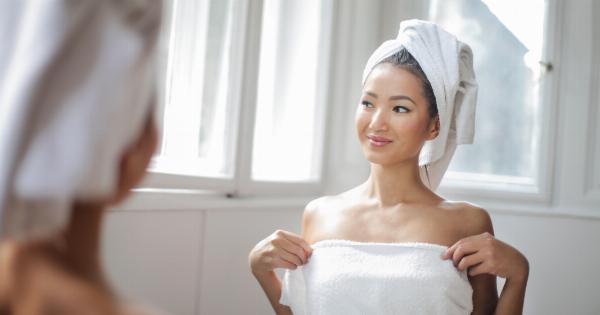Summer is the season where everyone loves to spend most of their time outdoors, soaking up some sun and enjoying the warm weather.
However, excessive exposure to the sun’s harmful rays can lead to many health problems such as skin cancer, premature aging, and sunburns.
Tanning is definitely an enjoyable activity, but it is crucial to recognize when it is time to call it a day.
If you are guilty of spending too much time in the sun, and your skin is burnt, it’s time to take a break from the sun and get under some shade.
The Health Dangers of Sun Tanning
Sun tanning is the process of deliberately purposefully exposing your skin to the sun’s UV rays to produce a tan. However, exposing yourself to too much sunlight, especially the UV rays, can lead to numerous health consequences:.
1. Sunburns
When you expose your skin to unprotected sunlight for long periods, your skin becomes burned, turning red and becoming painful. It can be mild or extreme, depending on the level of UV radiation you have been exposed to.
Sunburns can cause skin discoloration and even blistering.
2. Skin cancer
Excessive exposure to UV radiation can cause skin cancer because the UV rays damage the DNA in skin cells. This damage can lead to mutations that can cause skin cancer.
Skin cancer is the most common form of cancer in the United States, and it’s mostly caused by too much sun exposure. It can affect anyone, regardless of age, gender, or race, and can be deadly.
3. Premature aging
Excessive sun exposure causes premature aging by damaging the collagen and elastin fibres in your skin.
These fibres provide skin elasticity, and when they are damaged, the skin becomes less supple, leading to premature aging, wrinkles, and sagging skin.
4. Eye damage
The sun’s UV rays can also cause eye damage, such as cataracts and macular degeneration. This damage occurs when the rays penetrate the eye and damage the lens and retina. Protecting your eyes with sunglasses can help reduce the risk of eye damage.
Signs You Need to Get Out of the Sun
While sun tanning is an enjoyable activity, it is crucial to know when to get out of the sun, to protect your skin from harmful UV rays. Below are some signs to look out for:.
1. Redness and Pain
If your skin is redder than usual and is painful to the touch, it’s time to seek out some shade. This is an indication that you have already surpassed your skin’s capacity to handle UV radiation.
2. Peeling Skin
If your skin begins to peel after a day of tanning, it’s a sign that it’s time to go indoors and out of the sun. Peeling skin is an indication that your skin is damaged, and it needs time to heal.
3. Dizziness
Excessive heat exposure can lead to dizziness, which, if left unchecked, can progress to heatstroke. Heatstroke is a severe condition that requires immediate medical attention.
4. Feeling Tired or Weak
Excessive heat exposure can cause fatigue and weakness, which can be detrimental to your health. If you are feeling tired or weak, it’s time to call it a day and rest indoors.
Why It’s So Important to Get Out of the Sun
Getting out of the sun is essential for your skin’s well-being, and it’s something that everyone should practice. Here are some reasons why getting out of the sun is so vitally important:.
1. Helps Prevent Skin Cancer
Excessive sun exposure can lead to skin cancer, which is the most common form of cancer in the US. However, taking regular breaks from the sun can significantly reduce your risk of developing skin cancer.
2. Reduces the Risk of Premature Aging
One of the most common side effects of excessive sun exposure is premature aging. Getting out of the sun can help prevent premature aging, which can reduce the development of wrinkles, age spots, and sagging skin.
3. Protects Your Eyes
The sun’s UV rays can damage your eyes, and getting out of the sun can help reduce your risk of eye damage. Wearing sunglasses can help protect your eyes from UV radiation and reduce the risk of eye damage.
4. Increases Your Overall Comfort
Staying in the sun for prolonged periods can cause heat exhaustion, which can lead to dizziness, fatigue, and weakness. Getting out of the sun can help prevent heat exhaustion and increase your overall comfort level.
How to Get Out of the Sun Gracefully
If you are tanning and you need to get out of the sun, you don’t have to do it in a way that ruins your day. Here are some tips to ensure that you get out of the sun with grace:.
1. Be Prepared
Before you go out into the sun, make sure you have everything you need to stay comfortable in the shade. This includes bringing an umbrella, wearing sunscreen, and bringing a hat or sunglasses.
2. Find a Good Spot
If you are tanning at a beach or a pool, find a spot that is shaded and has a comfortable seating area. This will allow you to relax in comfort while still enjoying the warm weather.
3. Take Breaks Regularly
If you are tanning, take regular breaks to get out of the sun, reapply sunscreen, and stay hydrated. This will help reduce your risk of heat exhaustion, sunburns and damage to your skin.
4. Cover Up
If you are spending a lot of time in the sun, consider wearing long-sleeved clothing to protect your skin from UV radiation. You can also wear a hat or use an umbrella to keep the sun off your face and body.
Conclusion
Tanning is an enjoyable activity, but it’s crucial always to be aware of the risks involved. Getting out of the sun when necessary is key to protecting your skin from UV radiation, reducing your risk of skin cancer, and preventing premature aging.
If you prioritize taking regular breaks and staying protected from the sun, you’ll be able to enjoy the beauty of the outdoors while still taking care of your health.
























